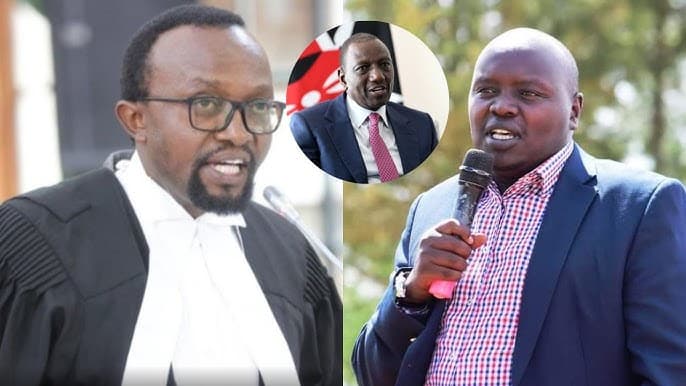We're loading the full news article for you. This includes the article content, images, author information, and related articles.
President William Ruto's ambitious declaration to transform Kenya into a first-world nation by 2055 has drawn sharp criticism from Advocate Ndegwa Njiru, who questions the feasibility and current trajectory of the country's development goals.

President William Ruto's declaration that Kenya will achieve first-world status by 2055 has ignited a national conversation, with prominent lawyer Ndegwa Njiru publicly challenging the President's vision. Speaking on Sunday, October 12, 2025, during a service commemorating AIC Ziwani Church's 70th anniversary in Nairobi, President Ruto outlined a 30-year plan to elevate Kenya, drawing parallels with the economic transformations seen in countries like South Korea, Singapore, and China.
President Ruto emphasised that his administration has a clear plan to achieve this ambitious goal, focusing on strategic investments in key sectors such as housing, healthcare, education, and agriculture. He also addressed the state of Nairobi, stating, "Nairobi cannot continue to be a city in filth." The President revealed that initiatives are underway, including the ongoing cleaning of the Nairobi River and finalising agreements with the private sector to improve the city's cleanliness.
Kenya has a history of long-term development blueprints, most notably Vision 2030, launched in 2008 by former President Mwai Kibaki. Vision 2030 aimed to transform Kenya into a newly industrialising, middle-income country providing a high quality of life to all its citizens by 2030. This vision was structured around five-year Medium-Term Plans, with significant progress reported in areas such as macroeconomic stability, infrastructure development, and increased access to education and healthcare.
President Ruto's new 2055 vision extends this ambition, proposing a shift from a "third-world" to a "first-world" country. He has indicated that he has engaged various political leaders, including former Prime Minister Raila Odinga, former President Uhuru Kenyatta, and KANU Chairman Gideon Moi, to build consensus around this long-term development agenda.
The implementation of such a transformative agenda would necessitate robust policy frameworks and effective governance. The current administration's focus on public-private partnerships for urban renewal, as seen in the Nairobi cleaning initiatives, reflects a strategy to leverage diverse resources. The Nairobi River Regeneration Project, launched in March 2025 with an estimated cost of KSh 50 billion, aims to restore the Nairobi, Mathare, and Ngong rivers by 2027 through a multi-agency approach involving government bodies, development partners, and local communities.
Advocate Ndegwa Njiru, a vocal critic of the current administration, has expressed skepticism regarding President Ruto's pronouncements. Njiru has previously criticised the President's performance on various fronts, including Kenya's international standing and economic policies. His challenge underscores a segment of public opinion that demands tangible results and accountability beyond aspirational statements.
Conversely, supporters of the President's vision point to ongoing projects and strategic engagements as evidence of commitment. The Nairobi River Regeneration Project, for instance, has engaged thousands of young people in clean-up efforts, with authorities reporting progress in unclogging sewers and expanding riverbanks.
Sources: World Bank, Trading Economics, Georank.org
Comparing Kenya's current economic indicators with those of developed nations like Singapore, South Korea, and China highlights the scale of the transformation envisioned. For example, Singapore's GDP per capita in December 2024 was estimated at $67,707, significantly higher than Kenya's estimated $2,470 for 2025. While Kenya has made progress in economic growth, achieving "first-world" status by 2055 would require sustained, accelerated development across all sectors.
The ambitious timeline and scope of President Ruto's vision carry inherent risks. Unforeseen economic downturns, political instability, or insufficient resource allocation could impede progress. The success of large-scale projects, such as the Nairobi urban renewal, hinges on consistent funding, effective coordination between national and county governments, and sustained private sector engagement. Public skepticism, as voiced by Advocate Njiru, could also impact national cohesion and support for government initiatives.
While the President has articulated a broad vision, specific details on the financing mechanisms, detailed implementation strategies, and measurable benchmarks for the 2055 target remain largely unknown. The definition of "first-world country" in the Kenyan context, beyond comparisons to Asian economic tigers, also requires further clarification to ensure a shared understanding among citizens and stakeholders.
President Ruto's administration aims to achieve first-world status by 2055, building upon ongoing efforts. The Nairobi River Regeneration Project is slated for substantial completion by January 2027. Further details on the broader 2055 plan are expected to emerge as the government continues to roll out its development agenda.
Observers will be keenly watching for the release of detailed strategic plans, specific budgetary allocations, and transparent progress reports related to the 2055 vision. The effectiveness of public-private partnerships in urban development and environmental restoration will also be a key indicator of the administration's capacity to deliver on its promises. The ongoing public discourse, particularly from legal and political commentators, will continue to shape the narrative around Kenya's long-term development aspirations.
Keep the conversation in one place—threads here stay linked to the story and in the forums.
Sign in to start a discussion
Start a conversation about this story and keep it linked here.
Other hot threads
E-sports and Gaming Community in Kenya
Active 9 months ago
The Role of Technology in Modern Agriculture (AgriTech)
Active 9 months ago
Popular Recreational Activities Across Counties
Active 9 months ago
Investing in Youth Sports Development Programs
Active 9 months ago
Key figures and persons of interest featured in this article